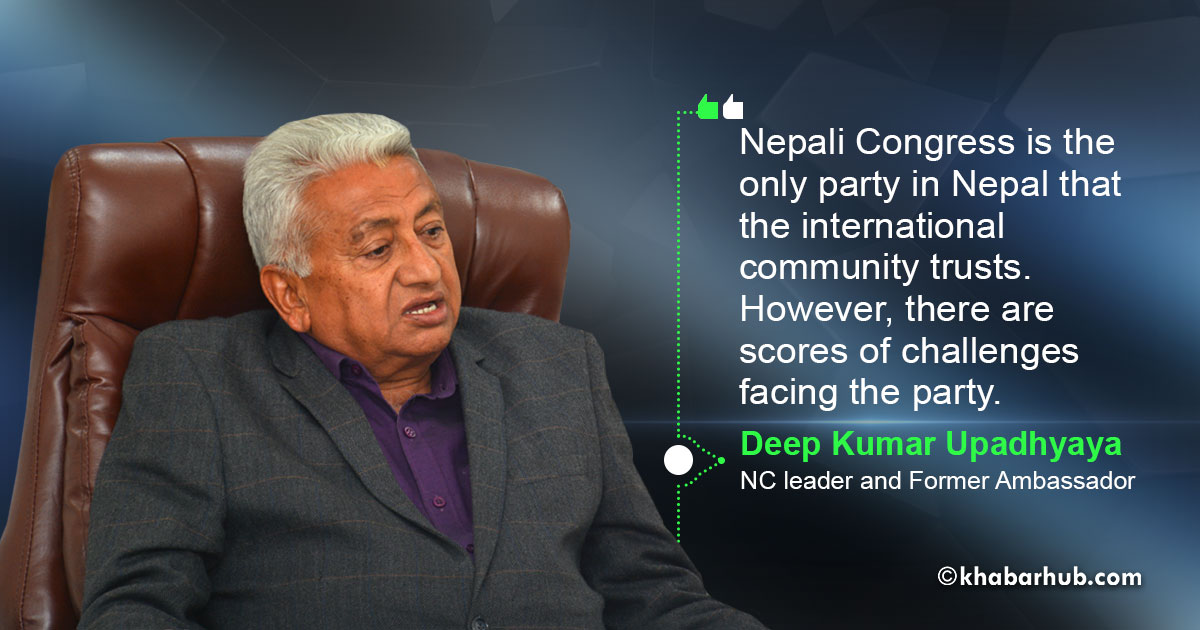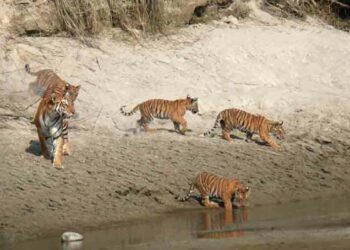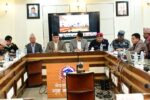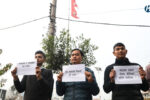Views recently expressed by General Secretary of Nepali Congress (NC) party, Shashanka Koirala on the issue of secularism, republic, and federalism have created ripples in the national political arena. Koirala’s statement raises several questions regarding the future political course in Nepal. Khabarhub talked to Deep Kumar Upadhyay, NC leader, former minister and former Nepali ambassador to India, for his views. Excerpts:
General Secretary of NC, Shashank Koirala stressed on holding a referendum on the issues of secularism, federalism, and republic, recently. How do you take this issue?
The constitution was promulgated in haste. Making mistakes is common but we should express readiness to rectify them. People are gradually realizing that the term ‘secularism’ was picked in a haste to be incorporated in the constitution.
Not only NC leader but also the leaders of the Nepal Communist Party (NCP) are now saying that the term was not chosen cautiously. The term in itself is negative.
Besides, there is a large number of people in favor of a Hindu State. Shashank Koirala raised the issue of a referendum against the party policy as it embodies the feelings of a large section of Nepali people. However, a change does not occur in a flash. It has to undergo a long process. The issue should be raised in the Mahasamiti meeting and also at the general convention of the party before it decides about the referendum.
Don’t you think that Koirala raised this issue as a political stunt to turn the tables in his favor for the upcoming general election?
He courted a lot of controversies as he failed to make an impression within the party even after becoming its general secretary. His latest views on secularism can be taken as an agenda to show his presence for the upcoming general convention.
NC hardly raises pressing issues of the people either in the street or in the parliament. How do you see the party’s future?
Nepali Congress is being led by ideals postulated by BP Koirala. It is the only party in Nepal that the international community trusts. However, there are scores of challenges facing the party. There are a lot of works to be done before the general convention. A broader spectrum should be envisaged to accommodate diverse views of the NC leaders in the general convention. The next leadership will address these issues.
Communists have greater influence in Nepali politics while the international community is playing an active role in Nepal. What could be the strategy of NC in the given context?
Nepal has no fixed foreign policies. It needs to have fixed and balanced foreign policies. The government should hold talks with concerned parties before taking a stand on any foreign issues.
For example, the government did not consult NC when it banned the ‘Biplav’ outfit and when it signed the agreement with the Alliance for Independence for Madhesh led by a secessionist leader, CK Raut.
NC should put its stand clearly before the government on such controversial issues. However, we should not make tall promises and should only speak of things that can be delivered.
Nepal Communist Party Chairman Pushpa Kamal Dahal is now in America. International community takes him as a human rights violator. Colonel Lama was arrested in Britain on the charge of violating human rights. What do you say to this?
I don’t see any problem with Prachanda visiting the United States of America. The powerful countries have their own strategies regarding human rights issues which may differ from those of developing countries.
The American ambassador has already issued an advisory regarding Prachanda’s visit to America. However, it is would be problematic to embark on a visit to Europe unless they grant permission to those once accused of human rights violations and war crimes.
Do you mean that the entire state mechanism is not credible in the eyes of the international community?
Despite the good impression created by Nepal Army in its world peacekeeping missions, at times, it seems to be at the disposal of the prime minister and the president. Nepal Police is infiltrated by politics and it, thus, cannot function independently.
Lack of unity and collective decision among political parties of the country on the issue of national interest will weaken the credibility of the state mechanism.









Comment